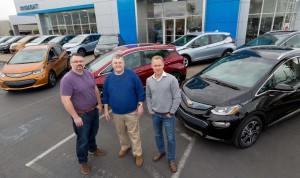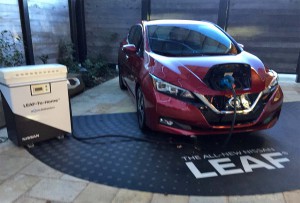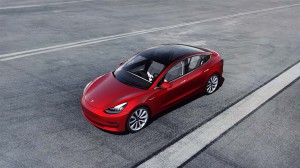Electric cars accounted for 7.1% of California car sales in the first three quarters of 2019 with fully electric, zero-emission car sales outrunning the plug-in hybrid sales.
EVs accounted for 4.1% of the vehicles sold in California while plug-in hybrids accounted for 3%, according to Veloz, which tracks the development of EV sales in the state.
“It’s no longer a matter of whether electric vehicles will take off, but how soon,” said Josh Boone, executive director of Veloz, public-private coalition of major electric car industry stakeholders, told TheDetroitBureau.com. California hit the 500,000 electric-car sales milestone in November.
Veloz’s monthly “Sales Dashboard” shows total sales of electric cars in the state was up 30% from the month before and 164% from a year ago.
(Tesla’s Musk expresses interest in closing GM plants. Click Here for the story.)
“Reaching 500,000 electric vehicles in California is yet another indicator that the future of transportation is electric. And that future is approaching faster than ever,” said Veloz board chair David Hochschild. “We have seen monthly sales of electric vehicles triple this year and California is well on our way to 5 million by 2030.”

Electric vehicles sales now account for 7.1% new vehicle sales in California with EVs accounting for 4.1% and plug-in hybrids 3%.
California, as is often the case, is leading a national trend.
““I think what we’re seeing is seismic shift,” not just because consumers are discovering EVs are greener “but they are a better way to drive. They’re fun, fast and quiet,” said Boone.
With the “Electric For All” campaign, even more Californians will know about and experience EVs. “And, like these half-million people, many, many more will fall in love with a better way to drive,” he added.
California is home to several of the world’s electric car-centric cities, including San Jose, San Francisco and Los Angeles. The Golden State’s electric car sales jumped 204% from August 2017 to August 2018, and 300% from January to August 2018.
New electric car registrations in California grew to 6.2% of total market in the first half of 2018, up from 4.8% in 2017 and 3.6% in 2016.
(Click Here for more about Trump ending EV subsidies by 2021.)
Regulations and improved fuel efficiency of California’s car fleet have helped drive down emissions over time, but population growth, lower fuel prices, improved economic conditions and higher overall employment are factors increasing fuel use and pollution.

California is looking to further reduce vehicle emissions and the increased sales of EVs helps that.
While California has met its 2025 climate goals, cars and trucks remain the largest source of emissions in the state and generated a 2% increase in emissions in 2016. Smog, soot and climate pollution from cars costs the state $15 billion dollars.
However, even with California capturing almost 50% of national electric car market, almost 70% of counties across the state received a failing grade for ozone pollution caused by tailpipe emissions.
Veloz recognizes that while electric car sales are increasing at a rapid clip, it is not happening fast enough to achieve the deep cuts in emissions that the state needs to achieve to protect people’s health and curb negative impacts on the environment. That is why it launched the public awareness campaign “Electric For All” to educate and inspire Californian’s to drive electric.
The trends of EV sales indicate that the demand for electric vehicles is growing quickly, according to Veloz’s analysis. The first million electric car sales worldwide took five years but the second million took just six months.
The time needed to reach each consecutive million electric cars sold has shrunk from 17 months for the second million to six months for the fourth million — rate faster than anyone anticipated.
(To see more about GM pushing to extend EV subsidies, Click Here.)
It took Norway a decade to reach 6% electric car sales but then only five years to go from 6% to 47%. Electric car sales are expected to represent 28% of global light-duty vehicle sales sometime shortly after 2025. Boone also expressed concern that if Trump kills the EV tax credits that could slow — though not kill — the growth of electric vehicles.

